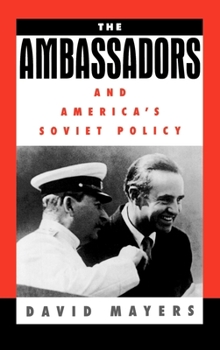The Ambassadors and America's Soviet Policy
Select Format
Select Condition 
Book Overview
George Kennan, Charles Bohlen, W. Averell Harriman, William Bullitt, Joseph E. Davies, Llewlleyn Thompson, Jack Matlock: these are important names in the history of American foreign policy. Together with a number of lesser-known officials, these diplomats played a vital role in shaping U.S. strategy and popular attitudes toward the Soviet Union throughout its 75-year history. In The Ambassadors and America's Soviet Policy, David Mayers presents the most comprehensive critical examination yet of U.S. diplomats in the Soviet Union.
Mayers' vivid portrayal evokes the social and intellectual atmosphere of the American embassy in the midst of crucial episodes: the Bolshevik Revolution, the Great Purges, the Grand Alliance in World War II, the early Cold War, the Cuban Missile Crisis, the rise and decline of detente, and the heady days of perestroika and glasnost. He also offers rare portraits of the professional lives of the diplomats themselves: their adjustment to Soviet life, the quality of their analytical reporting, their contact with other diplomats in Moscow, and their influence on Washington.
Assessing the strengths and weaknesses of American diplomacy in its most challenging area, this compelling book fills an important gap in the history of U.S. foreign policy and U.S.-Soviet relations. Readers interested in U.S. foreign policy, the cold war, and the policies and history of the former Soviet Union will find The Ambassadors and America's Soviet Policy an intriguing and informative work.
Mayers' vivid portrayal evokes the social and intellectual atmosphere of the American embassy in the midst of crucial episodes: the Bolshevik Revolution, the Great Purges, the Grand Alliance in World War II, the early Cold War, the Cuban Missile Crisis, the rise and decline of detente, and the heady days of perestroika and glasnost. He also offers rare portraits of the professional lives of the diplomats themselves: their adjustment to Soviet life, the quality of their analytical reporting, their contact with other diplomats in Moscow, and their influence on Washington.
Assessing the strengths and weaknesses of American diplomacy in its most challenging area, this compelling book fills an important gap in the history of U.S. foreign policy and U.S.-Soviet relations. Readers interested in U.S. foreign policy, the cold war, and the policies and history of the former Soviet Union will find The Ambassadors and America's Soviet Policy an intriguing and informative work.
Format:Hardcover
Language:English
ISBN:0195068025
ISBN13:9780195068023
Release Date:April 1995
Publisher:Oxford University Press
Length:368 Pages
Weight:1.68 lbs.
Dimensions:1.2" x 6.4" x 9.6"
Customer Reviews
0 rating





